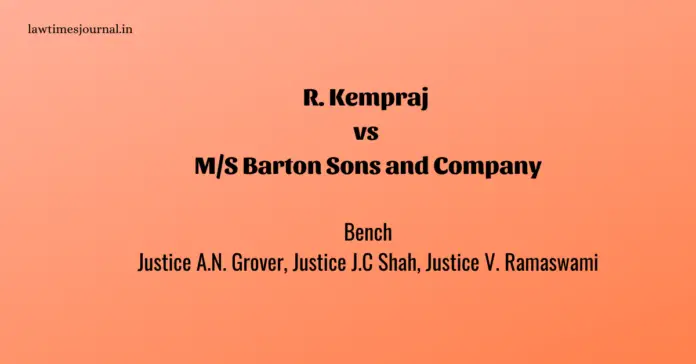
In the Supreme Court of India 1969 (2) SCC 594 Appellant R. Kempraj Respondent M/S Barton Sons and Company Date of Judgement 29/08/1969 Bench Justice A.N. Grover; Justice J.C Shah; Justice V. Ramaswami
Facts:
In 1951, The appellant Kempraj Shah gave property in Bangalore to the respondents for ten years on lease. It was subject to renewal on the same terms and conditions before the expiry of the current lease, for as many periods of Ten Years. In 1961, on being asked for the renewal of the lease, the Lessor, Mr. Kempraj denied. Therefore, Barton Son and Company filed a suit for specific performance before a trial court and it subsequently got decreed in all, the trial court, the first appellate court, and the high court. This was a case before the Supreme Court by Mr. Kempraj by the way of Special leave.
Laws involved :
Article 14 of the Transfer of Property Act,1882.
Issue Involved:
Whether the option of renewal of lease after ten years as per the lease agreement, falls under the ambit of Section 14( that states the rule against Perpetuity) under the Transfer of Property Act,1882?
Contentions put forward:
The appellant pleaded that the condition of renewal hasn’t been in allegiance with the rule of perpetuity stated under section 14 of the Transfer of Property Act,1882.
As per the court, the mischief was tried to be created with clauses relating to the renewal of ‘Covenant that runs with the land’ as per an English Law Concept and that correct formation of renewal clauses would immediately lead to the application of section 14 but the court didn’t agree on the same.
The Judgement :
The appeal was dismissed and the judgment was ruled in favor of the respondent by granting specific performance of the renewal of the lease.
Ratio Decidendi :
- It was stated that there is no transfer of property or any rights in the current case for the applicability of Section 14 of the Act as pleaded by the appellant in the current case.
- The rule against perpetuity to apply: There should be a transfer of property and there should be a vested interest of the transferee in the property. But here the covenant in the lease failed to create an interest[i] of such nature on the respondent and hence did not fall under the ambit of section 14 of the transfer of property Act,1882. Also, there is no transfer of property, the lessee pays for the occupation of the land while it still belongs to the owner.
- On the applicability of Ganesh Sonar v. Purnendu Narayan Singha and Ors,[ii]It was pointed out that the choice of renewal of lease was just a personal covenant to the contract; a contractual obligation and not the creation of any interest leading to the inapplicability of Section 14 of the Act.
- A parallel comparison was drawn to the English Law,[iii] where the covenant leads to perpetual renewal as long as the intention is clear and won’t lead to any objection on the grounds of perpetuity. In India, the equitable rule that the burden of a covenant runs with the land is to be found in section 40 of the Transfer of Property Act, but that section itself expressly says that the right of the covenant is not an interest in the land bound by the covenant nor an easement. It is not interesting because the Act does not recognize equitable estate. Thus, in the present case,even on the ground that renewal in lease contained covenants running with the land the rule against perpetuity contained in section 14 of the Act would not be applicable as no interest in the property had been created of the nature contemplated in the provision.
Conclusion:
Therefore, the essence of section 14 of the Transfer of Property,1882 a standard against remoteness of vesting, without which the general public will have to go through economic loss due to the stagnation of the properties. It would cause incredible hardship in the enforcing of law which will be impeding trade and commerce and may likewise result in the demolition of the property itself. The rule ensures both the betterment of society and the betterment of the property.
“The views of the authors are personal“
Reference
[i] vested interest – Interest that created in favor of the transferee in case of a transfer of property.
Contingent Interest- Interest that gets vested upon the happening or not happening of a certain unspecific event.
[ii] Ganesh Sonar v. Purnendu Narayan Singha and Ors, (1962) Patna 201.
[iii] Woodall v. Clifton (1905) 2 Ch 257.






